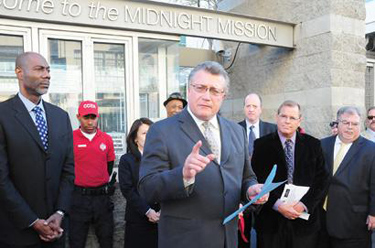
City Attorney Carmen Trutanich discussed the injunction in April, outside the Midnight Mission. (Photo: Gary Leonard)
In April, City Attorney Carmen Trutanich took an unprecedented step when he announced his office would seek an injunction to ban known Skid Row drug dealers from stepping foot in the neighborhood. Nearly seven months later, the proposal is law.
On Tuesday, Nov. 30, Superior Court Judge Theresa Sanchez-Gordon issued an order to enforce the proposed injunction on 23 defendants, all of whom have multiple convictions for drug crimes that took place in Skid Row. The injunction names 80 individuals, but also covers any person with a proven affiliation with the Grape Street Crips. The policy allows the city attorney's office to add up to 300 additional defendants if more people meet the multiple conviction criteria. Sanchez-Gordon has opted to roll out the policy in waves, targeting the first 23 named defendants at first, instead of all at once.
The order effectively makes Trutanich's April 7 civil complaint a criminal suit, but it doesn't immediately take effect. First, the LAPD must serve the 23 defendants with the order. Once that happens, there is a 45-day period before the injunction is enforceable. After that, they will be banned from the so-called Central City Recovery Zone.
Bounded by Broadway, Central Avenue, Third and Ninth streets, (see map here) the zone encompasses all of Skid Row, expanding slightly on the area that Central Division police often refer to as "the box." The area stretches into the Historic Core and Little Tokyo.
The 45-day grace period gives the defendants a chance to apply for a hardship exemption that would allow them to be in the area if they live, work or are receiving social services in the defined zone.
The injunction stems from Trutanich's finding that most Skid Row drug dealers don't live in the area. Instead, police say, they come in at night from other parts of the city, mostly South L.A. Among the 80 named defendants, 50 are believed to be gang members. A city attorney spokesman said that 13 individuals are affiliates of the Watts-based Grape Street Crips, which led prosecutors to target the whole group.
So far, no defendant or legal group working on the defendants' behalf has filed any kind of formal opposition to the injunction, though several defendants have written letters or reached out informally to city attorney officials to dispute their being named, said Anne Tremblay, the city attorney's gang unit supervisor.
Tremblay said officials have worked with those defendants, but none have been removed from the list.
Early skeptics of the injunction worried that it would lead to an assault on the Fourth Amendment rights of Skid Row residents, who risk being hassled by police who mistake them for someone named in the injunction. The order gives officers probable cause to arrest individuals they believe to be on the list if a suspect declines to provide identification, a city attorney official said earlier this year.
Police officials say that only specially trained officers will enforce the law, and they will always have information packets on hand that include photos of the defendants.
The injunction is the brainchild of Trutanich, who after attending the Central City East Association's monthly Skid Row walks became intent on developing a tool to protect the people who flock to the area for its recovery services.
Trutanich's office is treating the drug trade as a business operation, if illegitimate: The legal lynchpin of the injunction is section 17200 of the California Business and Professions Code, the Unfair Business Practices Act. The law, which regulates an array of fraudulent business activities including misleading advertising, is considered a broad, flexible and powerful tool for prosecutors.
The same code was used in 2008 to obtain an injunction against the Fifth and Hill gang, notorious for its role in the heroin trade around Pershing Square. The Fifth and Hill injunction was much smaller in scope compared to the Skid Row initiative, as it only named 15 individuals.
At a future court date, Sanchez-Gordon will consider a second order to enforce the injunction against the next wave of named defendants.











